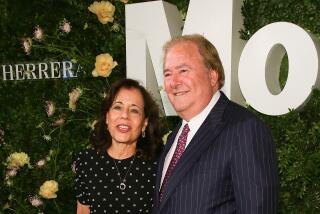Internal Probe Clears Global of Phony Network Capacity Swaps
- Share via
An internal investigation at Global Crossing Ltd. absolved senior managers Monday of creating sham swaps of fiber-optic network capacity to boost sales and stock prices, but the lawyer for a fired executive who raised the charges called the report a “complete and utter whitewash.”
The investigation, conducted by three directors appointed last April, found no evidence that the worldwide long-distance network builder, formed by Los Angeles financier Gary Winnick, engaged in phony transactions to make its financial health look better than it was.
In January 2002, Global Crossing filed what was then the biggest telecommunications industry bankruptcy petition with assets of $22.4 billion. It awaits final federal and state approvals to emerge from Chapter 11 proceedings.
Federal regulators are investigating whether the company used transactions known as capacity swaps to mask its financial weakness. Under such transactions, Global Crossing booked the entire sale price of capacity it was swapping with another company as revenue for a particular quarter while expensing the cost of the capacity it was buying over time. The immediate effect was higher revenue.
But the report said that, in hindsight, the company’s directors and top managers relied too heavily in 2000 and 2001 on capacity swaps with other companies, such as Qwest Communications International Inc., and that they failed to question the propriety of the transactions.
“Neither the company’s management nor its professional advisors addressed the inherent dangers of such reliance on a timely basis or undertook remedial action until it was too late to do so in the face of an industrywide economic collapse,” it said.
The internal probe stemmed from accusations made in an August 2001 letter to top executives by Roy L. Olofson, who then was vice president of finance.
The letter contended that such swaps lacked business purposes and were intended to inflate the company’s cash and earnings.
“The notion that everything was done properly is ludicrous,” said Olofson’s lawyer, Brian Lysaght. “This is bought-and-paid-for justification, and it won’t withstand analysis any more than previous [public relations] announcements did.”
Olofson was fired in November 2001.
The three independent directors -- Jeremiah D. Lambert, Alice T. Kane and Myron E. Ullman III -- reviewed 16 of the 36 swaps between the fourth quarter of 2000 and the third quarter of 2001 when Winnick and others sold huge amounts of stock.
Winnick, who left as chairman at the end of December, cashed out more than $575 million worth of stock during the timeframe under investigation.
The report said the 16 swaps were identified by the Securities and Exchange Commission, which is conducting its own investigation, as the ones of “primary interest and concern.”
Though they didn’t breach fiduciary duties, “the company’s management, board and outside advisors did not satisfy what we believe are appropriate standards of corporate stewardship and professionalism,” the report stated.






